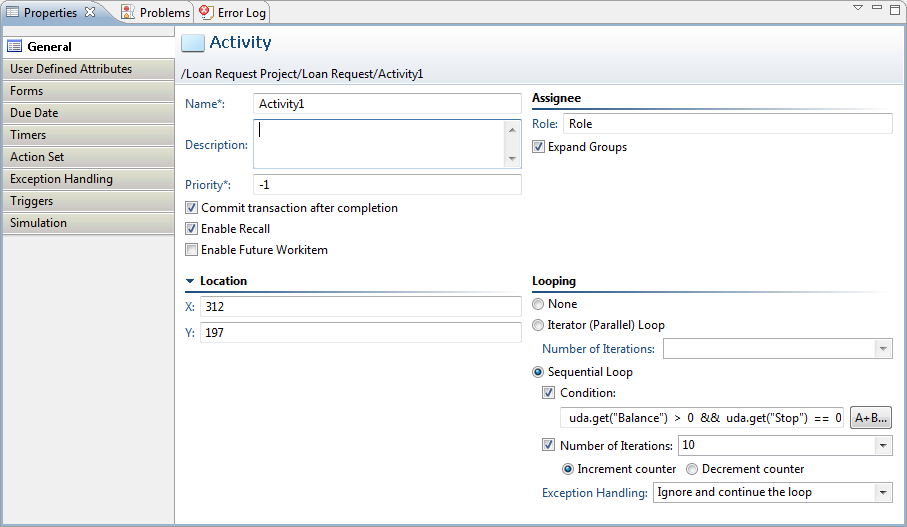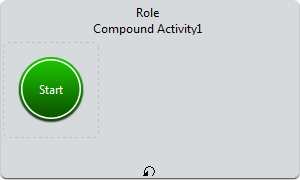In the Sequential Loop node, node instances are generated sequentially till a certain condition is satisfied. The Activity Node, Subprocess Node, and Compound Activity Node can be defined as the Sequential Loop node.
The following is a description of how to define the Sequential Loop node.
Select the node you want to define as the Sequential Loop node.
On the General tab in the Properties view, select Sequential Loop under Looping.
Settings for the repeating condition and the maximum number of repetitions for generating node instances can be performed as follows.
To specify settings for the repeating condition, select the Condition check box and type a JavaScript expression for the condition. It is also possible to create an expression by using the Expression Builder dialog box to specify it directly into the field. Node instances will be generated for as long as the specified repeated condition remains true (valid).
Note
The condition is assessed prior to generation of the node instance. If the condition is false from the very first time it is assessed, no node instances are generated.
To specify settings for the maximum number of repetitions, select the Number of Iterations check box and either type a value in the field or select an INTEGER-type UDA from the drop-down list. The integer value of the specified value or the selected UDA is deemed to be the number of node instances generated. Either addition or subtraction can be selected for the maximum number of repetitions counter.
If the Increment counter is selected, the repetitions counter begins at 1 and increases till the value specified for the maximum number of repetitions is reached. The loop ends when the maximum number of repetitions for the repetitions counter is reached.
If the Decrement counter is selected, the repetitions counter begins at the value specified for the maximum number of repetitions and decreases till it reaches 1. The loop ends when the repetitions counter reaches 1.
Note
It is possible to specify either the repeating condition or the count for the maximum number of repetitions, or both. If specifying both, the loop will end when one of the conditions is reached.
If neither is specified, it will not be possible to define the selected node as a Sequential Loop node.
Select exception handling from the drop-down list while the node instances are being repeatedly executed.
None: Exceptions are processed in accordance with the settings for handling node exceptions. For further information, see "Operating options for exception handling" covered later in this chapter.
Ignore and continue the loop: Ignore errors and continue the loop.
Break the loop: End the loop.
In the example below, both Conditions and Number of Iterations are defined for the Sequential Loop.
Figure 6.25 Sequential Loop definition

Note
Only 1 (outward-facing) arrow can be drawn from the Sequential Loop node.
It is not possible to specify settings for a due date and/or timer in the Activity Node that defined the Sequential Loop node.
Select None under Looping to disable the Sequential Loop node.
The Sequential Loop node is represented by a round arrow. Below is a representation of an Activity Node, Subprocess Node, and Compound Activity Node when defined as a Sequential Loop node.
Figure 6.26 Activity Node

Figure 6.27 Subprocess Node

Figure 6.28 Compound Activity Node

Operating options for exception handling
The table below indicates the status of loop operations, process instances, and loop node instances when executing the specified exception processes using an Activity Node as the Sequential Loop node.
Process where the error occurred | Specified exception process | Loop operation | State of loop node instance | State of process instance |
|---|---|---|---|---|
Beginning action (Role action agent) | Process exceptions based on the program | Stopped in the loop node instance where the error occurred. | Error | Error |
Ignore error, and continue loop | Continue loop in accordance with the settings for the loop condition and upper limit value of the loop count | Finished | Running | |
End the loop | End the loop, and activate the next node | Interrupted | Running | |
Finishing action | Process exceptions based on the program | Failure of selected operations | Running | Running |
Ignore error, and continue loop | Continue loop in accordance with the settings for the loop condition and upper limit value of the loop count | Finished | Running | |
End the loop | End the loop, and activate the next node | Interrupted | Running |
The table below indicates the status of loop operations, process instances, and loop node instances when executing the specified exception processes using a Subprocess Node as the Sequential Loop node.
Process where the error occurred | Specified exception process | Loop operation | State of loop node instance | State of parent process | State of child process |
|---|---|---|---|---|---|
Starting action | Process exceptions based on the program | Stopped in the loop node instance where the error occurred. | Error | Error | Not created |
Ignore error, and continue loop | Continue loop in accordance with the settings for the loop condition and upper limit value of the loop count | Finished | Running | Not created | |
End the loop | End the loop, and activate the next node | Interrupted | Running | Not created | |
Finishing action | Process exceptions based on the program | Stopped in the loop node instance where the error occurred. | Paused | Error | Paused |
Ignore error, and continue loop | Continue loop in accordance with the settings for the loop condition and upper limit value of the loop count | Finished | Running | Finished | |
End the loop | End the loop, and activate the next node | Interrupted | Running | Finished |
The table below indicates the status of loop operations, process instances, and loop node instances when executing the specified exception processes using a Compound Activity Node as the Sequential Loop node.
Process where the error occurred | Specified exception process | Loop operation | State of loop node instance | State of process instance |
|---|---|---|---|---|
Beginning action (Role action) | Process exceptions based on the program | Stopped in the loop node instance where the error occurred; the instance of the Compound Activity node's child node remains as is | Error | Error |
Ignore error, and continue loop | Continue loop in accordance with the settings for the loop condition and upper limit value of the loop count; the instance of the Compound Activity node's child node remains as is | Finished | Running | |
End the loop | End the loop, and activate the next node; the Compound Activity node's child node instance remains as is | Interrupted | Running | |
Finishing action | Process exceptions based on the program | If the Compound Activity node finishes normally after all the child node instances are complete, the loop stops at its designated loop node instance and the Compound Activity node and its valid child node is paused | Paused | Error |
An error occurs when the Compound Activity node work item is selected | Standing by at the subprocess | Running | ||
Ignore error, and continue loop | Continue loop in accordance with the settings for the loop condition and upper limit value of the loop count; the state of the child node instance will be as indicated below:
| Finished | Running | |
End the loop | Ends the loop and activates the next node; the state of the child node instance will be as indicated below:
| Interrupted | Running |